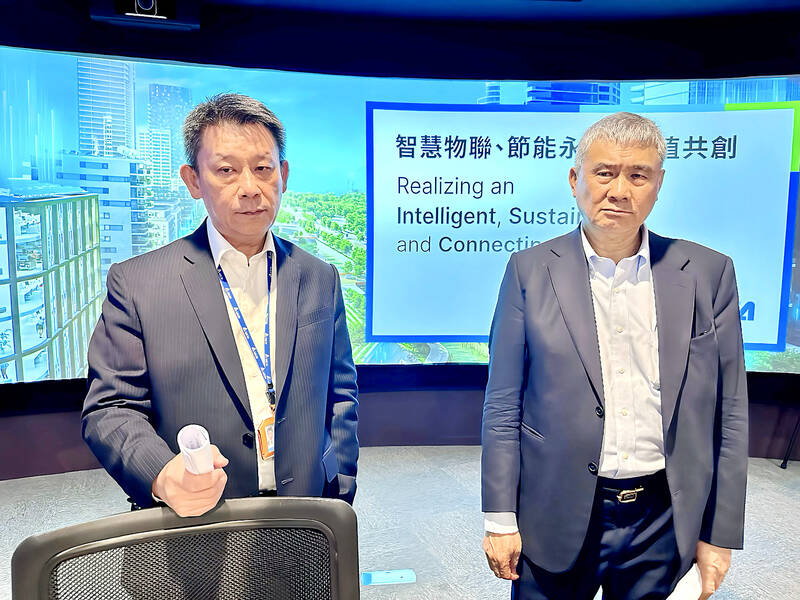Power supply and electronic components maker Delta Electronics Co (台達電) yesterday said that revenue this quarter would be higher than last quarter, partly due to fewer working days.
The company’s operations in the first half of the year are also expected to be better than the same period last year, on the back of rising sales of artificial intelligence (AI) related power supplies and electronic components, continued sales growth in power components for automotive electronics, and improvement in power solutions for automation and infrastructure businesses, it said.
Thanks to the production of heat dissipation parts for AI servers powered by Nvidia Corp’s GB200 chips in the second half of the year, coupled with the rising contribution of AI power supplies to total sales, Delta’s overall operations in the second half of the year would be stronger, it added.

Photo: Fang Wei-chieh, Taipei Times
Delta saw AI power supply revenue account for 4 to 5 percent of its total revenue in the first quarter, compared with 3 percent last year, the Chinese-language Liberty Times (the Taipei Times’ sister newspaper) reported on its Web site yesterday, citing Delta chief executive officer Cheng Ping (鄭平).
The company has made progress in the heat dissipation field for AI servers and plans to begin small volume production of some of the new products in the second half of the year, before starting mass production next year, Cheng said.
Delta products include power systems for information technology, automotive devices, telecommunications, industrial applications and medical items.
The rising adoption of electric vehicles (EVs) — led by the clean energy trend — has boosted Delta’s EV power products in the past few years and is likely to continue to support the firm’s growth momentum in the long term, although the growth is tapering off, Cheng said.
However, the company still maintains the view that the EV market would grow by 20 to 30 percent throughout the year, the Liberty Times reported, citing Delta chairman Yancey Hai (海英俊).
Delta on Tuesday posted its lowest profit last quarter in four years, attributing the weakness to higher operating expenses, which accounted for 21.4 percent of total sales in the quarter, compared with 18.5 percent a year earlier.
Earnings per share in the three-month period to March fell to NT$2.22, down 16.54 percent year-on-year and the lowest since the first quarter of 2020, when the number was NT$0.8, the company said in a report.
First-quarter revenue was NT$91.297 billion (US$2.81 billion), down 1.67 percent year-on-year, below market expectations due to lower shipments of power products for consumer electronics, industrial automation and infrastructure projects, it said.
Gross margin was 29.5 percent in the first quarter, up from 27.5 percent a year earlier, but operating margin fell by 0.95 percentage points to 8.1 percent due to higher research-and-development fees as well as selling and administrative expenses, the company said.

Hon Hai Precision Industry Co (鴻海精密) yesterday said that its research institute has launched its first advanced artificial intelligence (AI) large language model (LLM) using traditional Chinese, with technology assistance from Nvidia Corp. Hon Hai, also known as Foxconn Technology Group (富士康科技集團), said the LLM, FoxBrain, is expected to improve its data analysis capabilities for smart manufacturing, and electric vehicle and smart city development. An LLM is a type of AI trained on vast amounts of text data and uses deep learning techniques, particularly neural networks, to process and generate language. They are essential for building and improving AI-powered servers. Nvidia provided assistance

GREAT SUCCESS: Republican Senator Todd Young expressed surprise at Trump’s comments and said he expects the administration to keep the program running US lawmakers who helped secure billions of dollars in subsidies for domestic semiconductor manufacturing rejected US President Donald Trump’s call to revoke the 2022 CHIPS and Science Act, signaling that any repeal effort in the US Congress would fall short. US Senate Minority Leader Chuck Schumer, who negotiated the law, on Wednesday said that Trump’s demand would fail, while a top Republican proponent, US Senator Todd Young, expressed surprise at the president’s comments and said he expects the administration to keep the program running. The CHIPS Act is “essential for America leading the world in tech, leading the world in AI [artificial

DOMESTIC SUPPLY: The probe comes as Donald Trump has called for the repeal of the US$52.7 billion CHIPS and Science Act, which the US Congress passed in 2022 The Office of the US Trade Representative is to hold a hearing tomorrow into older Chinese-made “legacy” semiconductors that could heap more US tariffs on chips from China that power everyday goods from cars to washing machines to telecoms equipment. The probe, which began during former US president Joe Biden’s tenure in December last year, aims to protect US and other semiconductor producers from China’s massive state-driven buildup of domestic chip supply. A 50 percent US tariff on Chinese semiconductors began on Jan. 1. Legacy chips use older manufacturing processes introduced more than a decade ago and are often far simpler than

Gasoline and diesel prices this week are to decrease NT$0.5 and NT$1 per liter respectively as international crude prices continued to fall last week, CPC Corp, Taiwan (CPC, 台灣中油) and Formosa Petrochemical Corp (台塑石化) said yesterday. Effective today, gasoline prices at CPC and Formosa stations are to decrease to NT$29.2, NT$30.7 and NT$32.7 per liter for 92, 95 and 98-octane unleaded gasoline respectively, while premium diesel is to cost NT$27.9 per liter at CPC stations and NT$27.7 at Formosa pumps, the companies said in separate statements. Global crude oil prices dropped last week after the eight OPEC+ members said they would